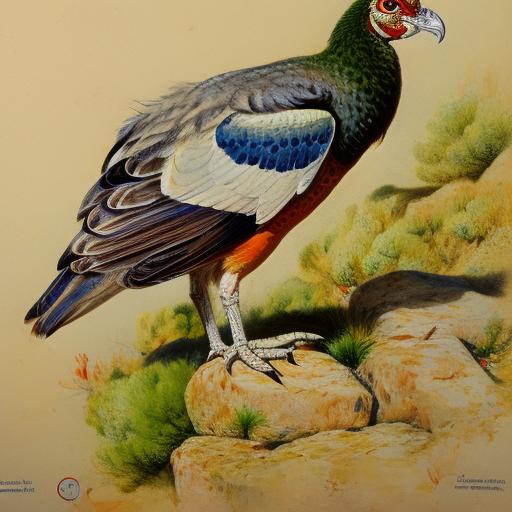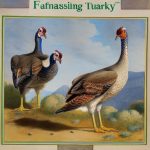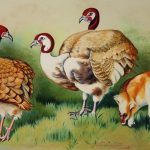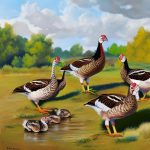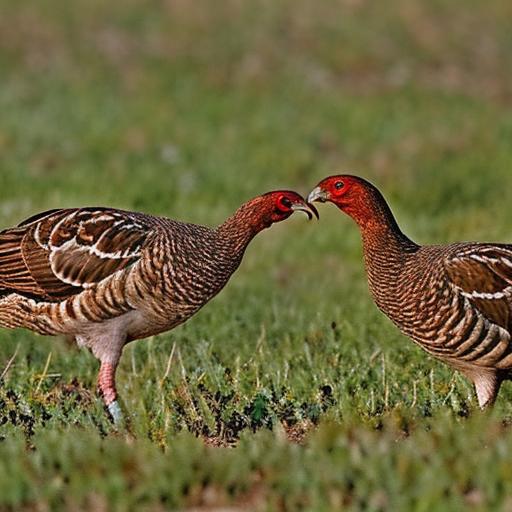When it comes to turkey breeding, it’s important to understand the different breeds available. There are several popular turkey breeds, each with its own unique characteristics and traits. Some of the most common turkey breeds include the Broad Breasted White, Broad Breasted Bronze, Bourbon Red, Narragansett, and Royal Palm.
The Broad Breasted White is one of the most popular commercial turkey breeds, known for its large size and fast growth rate. The Broad Breasted Bronze is similar to the White, but with a darker plumage. The Bourbon Red is a heritage breed known for its excellent flavor and ability to forage. The Narragansett is another heritage breed with a calm disposition and beautiful feather pattern. The Royal Palm is a smaller breed known for its striking black and white plumage.
Each breed has its own unique advantages and disadvantages when it comes to breeding. Understanding the characteristics of each breed is essential for selecting the right breeds for mating and ensuring successful breeding outcomes.
Key Takeaways
- There are several different turkey breeds, each with unique characteristics and traits that should be considered when selecting breeds for mating.
- When selecting breeds for mating, it is important to consider factors such as the desired traits in the offspring, the availability of the breeds, and the compatibility of the breeds for mating.
- Factors to consider when choosing breeds for mating include the breed’s size, growth rate, temperament, and ability to adapt to the local environment.
- Best practices for mating turkey breeds include providing proper housing, nutrition, and care for the turkeys, as well as ensuring the availability of suitable mates for breeding.
- Managing the mating process involves monitoring the turkeys for signs of mating readiness, providing a suitable environment for mating, and ensuring the safety and well-being of the turkeys during the mating process.
- Ensuring the health and well-being of mating turkeys involves providing proper nutrition, regular health checks, and a clean and safe environment for the turkeys to thrive.
- Conclusion: Maximizing success in turkey breeding requires careful consideration of the different turkey breeds, thoughtful selection of breeds for mating, and diligent management of the mating process to ensure the health and well-being of the turkeys and the success of the breeding program.
Selecting the Right Breeds for Mating
Selecting the right breeds for mating is crucial for successful turkey breeding. When choosing breeds for mating, it’s important to consider the specific traits and characteristics of each breed. For example, if you’re looking to produce turkeys with a large size and fast growth rate, you may want to consider mating Broad Breasted White or Broad Breasted Bronze turkeys. On the other hand, if you’re interested in producing turkeys with excellent flavor and foraging abilities, heritage breeds like Bourbon Red or Narragansett may be a better choice.
It’s also important to consider the genetic diversity of the breeds when selecting them for mating. Genetic diversity is essential for maintaining healthy and robust turkey populations. By selecting breeds with diverse genetic backgrounds, you can help prevent inbreeding and improve the overall health and vigor of the turkey population.
In addition to considering the specific traits and genetic diversity of the breeds, it’s also important to consider the availability of breeding stock. Some turkey breeds may be more readily available than others, so it’s important to consider the availability of breeding stock when selecting breeds for mating.
Factors to Consider When Choosing Breeds for Mating
When choosing breeds for mating, there are several factors to consider to ensure successful breeding outcomes. One important factor to consider is the climate and environment in which the turkeys will be raised. Different turkey breeds have different tolerances to heat, cold, and humidity, so it’s important to select breeds that are well-suited to the local climate and environmental conditions.
Another factor to consider is the intended purpose of the offspring. If you’re breeding turkeys for meat production, you’ll want to select breeds known for their large size and fast growth rate. If you’re breeding turkeys for egg production, you’ll want to select breeds known for their egg-laying abilities. Considering the intended purpose of the offspring will help you select breeds that are well-suited to your specific breeding goals.
It’s also important to consider the temperament and behavior of the different turkey breeds when choosing them for mating. Some breeds may be more docile and easy to handle, while others may be more aggressive or flighty. Considering the temperament and behavior of the breeds will help you select breeds that are well-suited to your management style and handling capabilities.
Best Practices for Mating Turkey Breeds
When it comes to mating turkey breeds, there are several best practices to keep in mind to ensure successful breeding outcomes. One of the most important best practices is to provide adequate space and facilities for mating. Turkeys can be territorial animals, so it’s important to provide enough space for them to mate without feeling crowded or stressed.
Another best practice is to carefully monitor the mating process and intervene if necessary. Sometimes, turkeys may have difficulty mating due to physical limitations or behavioral issues. It’s important to closely monitor the mating process and provide assistance if needed to ensure successful breeding outcomes.
It’s also important to carefully manage the male-to-female ratio when mating turkey breeds. A good rule of thumb is to have one male for every 8-10 females to ensure successful mating without causing excessive stress or aggression among the turkeys.
In addition, providing a high-quality diet and proper nutrition is essential for successful mating. Proper nutrition will help ensure that the turkeys are in good reproductive condition and able to produce healthy offspring.
Managing the Mating Process
Managing the mating process is crucial for successful turkey breeding. One important aspect of managing the mating process is providing a suitable environment for mating. This includes providing adequate space, comfortable nesting areas, and protection from predators and extreme weather conditions.
It’s also important to carefully monitor the behavior of the turkeys during the mating process. This includes observing their interactions, ensuring that mating is occurring regularly, and intervening if any issues arise.
Another important aspect of managing the mating process is ensuring proper timing. Turkeys are seasonal breeders, so it’s important to time mating activities according to their natural breeding cycles. This may involve providing artificial lighting or manipulating environmental conditions to stimulate breeding activity.
It’s also important to carefully manage the nesting and egg-laying process following mating. Providing suitable nesting areas and collecting eggs regularly will help ensure successful incubation and hatching of healthy offspring.
Ensuring the Health and Well-being of Mating Turkeys

Ensuring the health and well-being of mating turkeys is essential for successful breeding outcomes. One important aspect of ensuring their health and well-being is providing regular veterinary care and monitoring for any signs of illness or disease. Regular health checks will help identify any potential issues early on and prevent them from affecting breeding activities.
Another important aspect of ensuring the health and well-being of mating turkeys is providing a clean and sanitary environment. This includes regular cleaning of housing facilities, providing clean bedding materials, and ensuring access to fresh water and high-quality feed.
It’s also important to provide suitable protection from predators and environmental stressors during the mating process. This may involve using fencing or netting to protect turkeys from predators, providing shelter from extreme weather conditions, and minimizing sources of stress in their environment.
In addition, providing proper nutrition and a balanced diet is essential for ensuring the health and well-being of mating turkeys. A high-quality diet will help ensure that turkeys are in good reproductive condition and able to produce healthy offspring.
Maximizing Success in Turkey Breeding
In conclusion, maximizing success in turkey breeding involves understanding the different turkey breeds, selecting the right breeds for mating, considering various factors when choosing breeds for mating, implementing best practices for mating turkey breeds, managing the mating process effectively, and ensuring the health and well-being of mating turkeys.
By carefully considering these factors and following best practices, turkey breeders can increase their chances of successful breeding outcomes and produce healthy offspring with desirable traits. Whether breeding turkeys for meat production, egg production, or conservation purposes, careful management of the breeding process is essential for maximizing success in turkey breeding.
When it comes to selecting the best turkey breeds for mating, it’s essential to consider factors such as temperament, size, and egg production. Understanding the characteristics of different turkey breeds can help poultry enthusiasts make informed decisions for successful mating and breeding. For more information on poultry breeding and housing, check out this insightful article on what kind of coop is best for chickens. This resource provides valuable insights into creating a suitable environment for poultry, which is crucial for successful mating and breeding outcomes.
FAQs
What are the best turkey breeds for mating?
There are several turkey breeds that are known for their suitability for mating, including the Broad Breasted Bronze, Broad Breasted White, Narragansett, and Bourbon Red.
What characteristics should I look for in turkey breeds for mating?
When selecting turkey breeds for mating, it is important to consider factors such as fertility, size, and temperament. Look for breeds that are known for their reproductive success, as well as those that are well-suited for natural mating.
Are there specific turkey breeds that are better for natural mating?
Some turkey breeds, such as the Heritage breeds like Narragansett and Bourbon Red, are known for their ability to naturally mate. These breeds are often preferred for those looking to raise turkeys in a more traditional, natural setting.
What are the advantages of choosing specific turkey breeds for mating?
Selecting specific turkey breeds for mating can help ensure reproductive success, as well as produce offspring with desirable traits such as size, color, and temperament. Additionally, some breeds are better suited for natural mating, which can be beneficial for those looking to raise turkeys in a more natural, sustainable manner.
How can I determine which turkey breed is best for mating in my specific situation?
When choosing turkey breeds for mating, it is important to consider your specific goals and the conditions in which the turkeys will be raised. Factors such as available space, desired traits in offspring, and preferred mating methods should all be taken into account when selecting the best breed for your situation.
Meet Walter, the feathered-friend fanatic of Florida! Nestled in the sunshine state, Walter struts through life with his feathered companions, clucking his way to happiness. With a coop that’s fancier than a five-star hotel, he’s the Don Juan of the chicken world. When he’s not teaching his hens to do the cha-cha, you’ll find him in a heated debate with his prized rooster, Sir Clucks-a-Lot. Walter’s poultry passion is no yolk; he’s the sunny-side-up guy you never knew you needed in your flock of friends!

